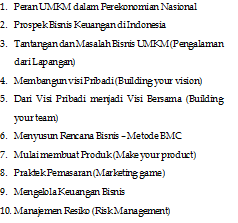Pembentukan Wirausaha Muda melalui Inkubator Bisnis Kewirausahaan Universitas PGRI Palangka Raya The Formation of Young Entrepreneurs in The Business Incubator of Universitas PGRI Palangka Raya
Main Article Content
Abstract
Alumni of High Education is expected to be not only job seekers but also job creators. The role of the business world in employment is enormous, both large businesses, medium businesses, and MSMEs. The absorption of labor by SMEs is far greater than others. However, the development of MSMEs is still hampered by several obstacles, including limited knowledge in the field of production technology, limitations in reading the market, marketing technology is always simple, not thinking about strategic plans both short and long term and others. Universitas PGRI Palangka Raya tries to play a role in increasing employment through the establishment of new entrepreneurs and technology-based through Business Incubator of Universitas PGRI Palangka Raya. The novelty of the approach developed in developing this Entrepreneurial Business Incubator is the application of Human Design to detect potential and weaknesses of tenants so that a business that is suitable for the tenant can be determined. The Human Design approach will help provide direction for tenants to start their own business. The selection of tenants starts from the Entrepreneurship Seminar, which is then followed by a one-week Entrepreneurship Training Bootcamp. During the Entrepreneurship Training Bootcamp, tenants will be shown their potential and weaknesses with the Human Design approach. After the Entrepreneurship Training Bootcamp, tenants are asked to perfect their business plans and are still given Entrepreneurship Coaching. Until the end of the first-year program, eight successful independent entrepreneurs have been formed.
Downloads
Article Details
Authors who publish with this journal agree to the following terms:
- Any article on the copyright is retained by the author(s).
- Author grant the journal, right of first publication with the work simultaneously licensed under a Creative Commons Attribution License that allows others to share work with acknowledgment of the work authors and initial publications in this journal.
- Authors are able to enter into a separate, additional contractual arrangements for non-exclusive distribution of published articles of work (eg, post-institutional repository) or publish it in a book, with acknowledgment of its initial publication in this journal.
- Authors are permitted and encouraged to post their work online (e.g., in institutional repositories or on their websites) prior to and during the submission process, as can lead to productive exchanges, as well as earlier and greater citation of published work.
- The article and any associated published material is distributed under the Creative Commons Attribution-ShareAlike 4.0 International License
References
Bank Indonesia. 2015. Profil Bisnis Usaha Mikro, Kecil Dan Menengah (UMKM). Jakarta: Lembaga Pengembangan Perbankan Indonesia-Bank Indonesia.
Frinces, Z.H. 2010. Pentingnya Profesi Wirausaha di Indonesia. Jurnal Ekonomi dan Pendidikan. 7(1):34-57. https://doi.org/10.21831/jep.v7i1.576
Hasbullah, R., Surahman, M., Yani, A., Almada, D.P., Faizaty, E.N. 2014. Model Pendampingan UMKM Pangan Melalui Inkubator Bisnis Perguruan Tinggi. Jurnal Ilmu Pertanian Indonesia. 19(1):43-49.
Priastiwi, D., Handayani, H.R. 2019. Analisis Pengaruh Jumlah Penduduk, Pendidikan, Upah Minimum, dan PDRB Terhadap Tingkat Pengangguran Terbuka Di Provinsi Jawa Tengah. Diponegoro Journal of Economics. 1(1):159-169.
Salam, H.A. 2018. Urgensi Pendidikan Kewirausahaan Dalam Menghasilkan Wirausahawan Muda Dari Perguruan Tinggi. Ekspose : Jurnal Penelitian Hukum dan Pendidikan. 17(2):653-664. http://dx.doi.org/10.30863/ekspose.v17i2.121
Scroeber, P. 2012. Human Design System. Derendingen: Jovian Archive Media.
Srihadiastuti, R., Hidayatullah, D.S. 2018. Analisis Penyebab Kegagalan Mendirikan Usaha Baru Pada Para Lulusan Program Wirausaha Baru Jawa Barat Kelas Ide Bisnis. Jurnal Ekonomi Pendidikan dan Kewirausahaan. 6(1):31-44. http://dx.doi.org/10.26740/jepk.v6n1.p31-44
Sudarno, S. 2011. Kontribusi Usaha Mikro, Kecil dan Menengah (UMKM) dalam Penyerapan Tenaga Kerja di Depok. Jurnal Ekonomi & Bisnis. 10(2):139-146. https://doi.org/10.32722/eb.v10i2.446
Sulistiani, D. 2014. Analisis SWOT Sebagai Strategi Perusahaan Dalam Memenangkan Persaingan Bisnis. eL-Qudwah: Jurnal Penelitian Integrasi Sains dan Islam. 7(2):1-10.
Wiratno, S. 2012. Pelaksanaan Pendidikan Kewirausahaan di Pendidikan Tinggi. Jurnal Pendidikan dan Kebudayaan. 8(4):453-466. https://doi.org/10.24832/jpnk.v18i4.101
Ulya, I. 2017. Implementasi Pengembangan Enterpreneurship Dalam Kurikulum Prodi PGMI Institut Pesantren Mathali’ul Falah Pati-Jawa Tengah. Quality. 5(2):233-252. http://dx.doi.org/10.21043/quality.v5i2.3060
